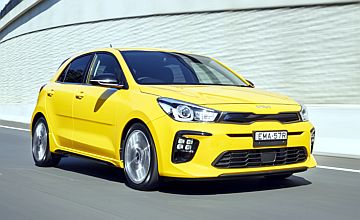2023 Kia Rio GT-Line review

Overview
Kia updated its Rio five door hatch a couple of years ago to extend the model’s life in preparation for, presumably, an electrified replacement.
Topping out the range, Rio GT-Line as tested here goes for a reasonable $25,590 plus on-road costs but light-segment competitors such as Suzuki’s GLX Swift Turbo offer more power and similar features for roughly the same money.
You might cross-shop a Rio GT-line against a Toyota Yaris – which is is premium priced spec-for-spec – and there’s always the VW Polo and Mazda2 for those after a classy option at this end of the market.
The Rio has been around a long time and is starting to show its age but Kia has been able to keep it current by progressively tweaking the interior, adding more technology and safety kit and refreshing the exterior appearance.
The GT-Line does well with goodies like climate control, non-radar cruise control, faux carbon-fibre fascia, alloy pedals, sports steering wheel, six speaker audio, heated exterior mirrors, a decent 8.0-inch infotainment touch screen and seven-speed dual-clutch transmission, plus sporty body hardware and finishes that set it apart.
It misses out on proprietary sat-nav, leather or front parking sensors, though adding value are 17-inch alloys, a variant-specific grille, additional lights, a dual outlet exhaust with rear diffuser and some dark chrome exterior fixtures.
Our test car’s bright yellow duco certainly lifted the Rio’s appearance and no doubt provided a satisfying ‘spotto’ for children on local roads during our week-long test.
A five seater, Rio GT-Line provides a reasonable amount of storage in the cabin and a decent size luggage space at the back with a space saver spare underneath.
Small side bolsters help keep front seat occupants planted while dimensionally, Rio GT-Line offers adequate room for passengers up to 183cm without touching the roof liner.
Power comes from a feisty-sounding three pot 1.0-litre turbo petrol engine with a maximum 74kW (same power as the naturally aspirated 1.4-litre found in lesser Rios) but with more torque rated at 172Nm delivered from 1500rpm to 4500rpm.
Ride and handling was locally calibrated way back by suspension and car set-up guru Graeme Gambold.
He does a good job, Graeme, especially as in this case he was working with fairly rudimentary components including a simple torsion beam rear axle and MacPherson strut front suspension.
Safety is well covered off as the five-star ANCAP-rated Rio GT-Line scores autonomous emergency braking with pedestrian and cyclist recognition, forward collision warning, active lane keeping assist, driver attention alert and automatic high beam to name a few high tech driver assist safety functions.
That’s in addition to a reverse camera with parking assistance, LED headlights, auto wipers and auto headlights.
Driving Impressions
The Rio GT-Line has good performance to a point, qualified by the lag between pushing the accelerator and the car actually taking off.
It’s sometimes exacerbated by the dual-clutch automatic transmission being in the wrong gear at the wrong time, which can be somewhat concerning – as is the hesitation between engaging first from reverse.
Waiting, waiting.
Once on boost, the little three lunger delivers decent get-go such that it actually feels sporty, a feeling accentuated when using the paddle-shifters for manual cog swaps.
Unfortunately, Kia saw fit to dock some 14kW from the 1.0-litre engine’s power output (from 88kW down to 72kW) at the last upgrade, making the GT-Line less of a “sporty” hatch.
Kia says the Rio GT-Line will consume 5.3 litres/100km on the combined cycle but we saw the readout staying around 6.1 litres/100km in mixed driving. The car uses regular 91 RON unleaded for appreciable running costs savings.
Drive feel is good all things considered, despite weighing in at a hefty 1197kg for its size, with sharp steering responses and flat cornering the order of the day.
It can deliver a choppy ride on broken road surfaces with a surprising level of bump thump coming up from the wheels through the suspension. Ultimate cornering attitude is push understeer that is the norm for such a car but hardly sporty.
The four-wheel disc brakes are strong (the GT-Line has larger 280mm fronts) and give the car an edge over some of the rear drum-brake-equipped competition.
Kia’s tyre choice is sage with relatively soft 240 treadwear rubber gripping the road in the wet and dry.
A distinctive three-pot thrum emanates from under the bonnet when you turn up the wick, sounding a bit like a Triumph triple motorcycle and is pleasing to the ear.
The Rio GT-Line is easy to park due to its compact dimensions and easy to drive with relatively light controls and handy dynamics.
On a long drive, the GT-Line proved comfortable and capable cruising easily at the limit with plenty of acceleration in reserve and enough torque to power up most hills without a down change. Maximum torque comes in at a low 1500rpm rolling through to 4500rpm.
The seats are comfortable and visibility in all directions is virtually unimpeded.
But the intrusive active lane-keep assist has to be turned off every time you restart otherwise holding the wheel is like holding a wriggling worm. Also annoying is the engine stop-start that, again, reactivates on start-up.
The mostly hard-surface interior is functional and follows a generic Kia design with familiar switches and controls throughout, accentuated by the sports steering wheel, faux carbon-fibre fascia and alloy pedals.
Audio quality from the sound system is average and the auto high beam has, at times, a mind of its own.
The Rio is an old car drawing towards the end of its model life. It’s been popular but now faces tougher, newer, keenly priced competition.
Perhaps the flagship Rio would have been better served with Kia’s excellent 1.6-litre turbo four-cylinder from the Seltos; then it would have really been a sporty hatch like the Hyundai i20 N.